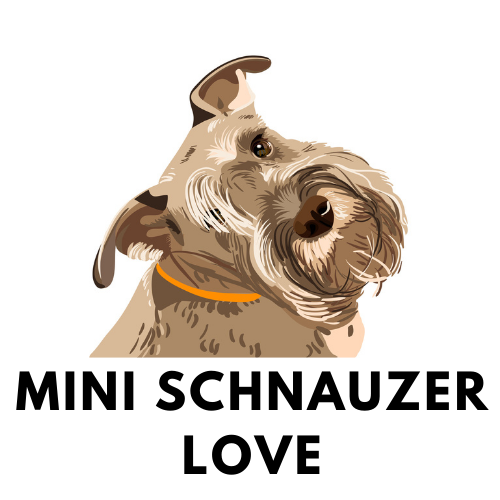
Introduction to Mini Schnauzer Puppy Blues
Welcoming a Mini Schnauzer puppy into your home can be an exciting experience. However, it’s not uncommon for new pet owners to experience what is known as the “Puppy Blues”. This term refers to the feelings of anxiety, frustration, and overwhelm that can come with the responsibility of caring for a new puppy. Let’s delve into what Puppy Blues are and why Mini Schnauzer puppies are particularly susceptible to it.
- Understanding the concept of Puppy Blues
- Why Mini Schnauzer puppies are susceptible to Puppy Blues
The Puppy Blues is a term used to describe the emotional roller coaster that many new pet owners experience. It’s a mix of joy, love, exhaustion, frustration, and sometimes even regret. This can happen when the reality of caring for a puppy, with its demands for attention, training, and care, becomes overwhelming. It’s important to remember that these feelings are normal and temporary. With time, patience, and the right strategies, you can navigate this challenging phase successfully.
Mini Schnauzer puppies are known for their lively and spirited nature. They are intelligent, energetic, and require a lot of mental and physical stimulation. This breed is also known for its stubborn streak, which can make training a bit challenging for first-time owners. These characteristics, while endearing, can also make Mini Schnauzer puppies more likely to induce Puppy Blues in their owners. However, with understanding and patience, these challenges can be overcome and you can enjoy a rewarding relationship with your Mini Schnauzer.
In the following sections, we will explore how to navigate the early months with your Mini Schnauzer, effective training strategies during the Puppy Blues phase, and success stories of owners who have successfully overcome the Puppy Blues. Stay tuned!
Early Months with Your Mini Schnauzer
The early months with your Mini Schnauzer can be a time of joy and excitement. However, they can also present some challenges. As a new pet owner, you may face a few hurdles as your puppy adjusts to its new environment.
Challenges with Your Mini Schnauzer
Like all puppies, Mini Schnauzers can present certain challenges during their early months. Two of the most common issues are training difficulties and behavioral problems. Let’s take a closer look at these challenges:
- Training Difficulties
- Behavioral Issues
Training a Mini Schnauzer puppy can be a challenging task. They are intelligent and energetic dogs, which can sometimes make them stubborn and resistant to training. Consistency and patience are key when training your Mini Schnauzer. It’s also important to start training early, as this can help to prevent bad habits from forming.
Behavioral issues are another common challenge with Mini Schnauzers. These can include excessive barking, chewing on furniture, or showing aggression towards other dogs. It’s important to remember that these behaviors are often a result of boredom or anxiety. Providing your Mini Schnauzer with plenty of exercise and mental stimulation can help to alleviate these issues.
Despite these challenges, remember that the early months with your Mini Schnauzer are a crucial time for bonding and establishing good habits. With patience, consistency, and a lot of love, you can help your puppy grow into a well-behaved and happy adult dog.
Navigating Puppy Blues
During the early months with your Mini Schnauzer, you may encounter a phase known as the ‘Puppy Blues’. This can be a challenging time, but understanding what it entails and how to navigate it can make all the difference. Let’s explore this further.
- Recognizing signs of Puppy Blues
- Understanding your Mini Schnauzer’s needs
Recognizing the signs of Puppy Blues is the first step towards managing this phase effectively. Puppy Blues is often characterized by feelings of overwhelm, frustration, and sometimes regret after bringing a new puppy home. These feelings can be triggered by various factors, such as the puppy’s incessant crying, biting, or house soiling. It’s important to remember that these behaviors are normal for a young puppy and are part of their learning and development process.
Understanding your Mini Schnauzer’s needs can help alleviate some of the stress associated with Puppy Blues. Mini Schnauzers are energetic, intelligent, and sociable dogs that require regular exercise, mental stimulation, and social interaction. They also thrive on routine and consistency. Therefore, establishing a regular feeding, exercise, and training schedule can help meet their needs and reduce unwanted behaviors.
Remember, experiencing Puppy Blues is not a sign of failure or an indication that you’re not a good pet parent. It’s a common phase that many new dog owners go through. With patience, understanding, and the right strategies, you can navigate this phase successfully and build a strong and loving bond with your Mini Schnauzer.
| Signs of Puppy Blues | Mini Schnauzer’s Needs |
|---|---|
| Feelings of overwhelm, frustration, regret | Regular exercise, mental stimulation, social interaction |
| Puppy’s incessant crying, biting, house soiling | Routine and consistency in feeding, exercise, training |
Mini Schnauzer Training During Puppy Blues
Training your Mini Schnauzer during the puppy blues phase can be a challenging task. However, with the right techniques and a lot of patience, you can help your puppy overcome this difficult period. Let’s explore some effective training techniques.
Training Techniques
There are several training techniques that you can use to help your Mini Schnauzer during the puppy blues. Here are two of the most effective methods:
- Positive Reinforcement
- Consistency in Training
Positive reinforcement is a powerful training technique. It involves rewarding your puppy for good behavior, which encourages them to repeat it. For instance, if your Mini Schnauzer sits when you command it to, give it a treat or a pat on the head. This will make your puppy associate sitting on command with positive outcomes, making it more likely to obey in the future.
Consistency is key when it comes to training your Mini Schnauzer. Make sure to use the same commands and rewards each time. This helps your puppy understand what you expect from it. For example, if you use the command ‘sit’ one day and ‘down’ the next, your puppy might get confused. Stick to one command and use it consistently.
Remember, training a puppy during the puppy blues phase requires patience and understanding. It’s a tough time for your Mini Schnauzer, but with your help, it can navigate through it successfully.
Overcoming Training Challenges
Training a Mini Schnauzer during the puppy blues phase can be a challenge. However, with patience and the right approach, you can overcome these hurdles. Let’s discuss two common challenges and how to address them.
- Addressing Stubbornness
- Patience: Remember, patience is key. It might take a little longer for your Mini Schnauzer to learn a command, but with consistent effort, they will get it.
- Positive Reinforcement: Reward your puppy when they follow a command. This can be a treat, a toy, or simply a pat on the head. This will encourage them to repeat the behavior.
- Dealing with High Energy Levels
- Regular Exercise: Make sure your Mini Schnauzer gets plenty of exercise. This could be a walk in the park, a game of fetch, or even a run in your backyard.
- Training Sessions: Incorporate training sessions into their exercise routine. This not only helps them burn energy but also helps them learn new commands.
Mini Schnauzers are known for their stubbornness. This trait can make training a bit difficult. But don’t worry, it’s not impossible. Here’s how you can deal with it:
Mini Schnauzers are energetic dogs. They need regular exercise to burn off their energy. If they don’t get enough exercise, they can become hyperactive, which can make training more challenging. Here’s how you can manage their energy levels:
Remember, every Mini Schnauzer is unique. What works for one might not work for another. It’s all about understanding your puppy and adapting your training methods to suit their needs. With time and patience, you can overcome these training challenges and help your Mini Schnauzer grow into a well-behaved adult dog.
Puppy Blues Solutions for Your Mini Schnauzer
Having a Mini Schnauzer puppy can be a joyous experience, but it can also come with its share of challenges, commonly known as the ‘puppy blues’. But don’t worry, there are effective solutions to help you and your puppy navigate this phase. Let’s explore some behavioral solutions.
Behavioral Solutions
Behavioral solutions focus on addressing the root causes of your puppy’s behavior. Two key strategies include establishing a routine and providing mental stimulation.
- Establishing a Routine
- Providing Mental Stimulation
Just like children, puppies thrive on routine. A consistent schedule for meals, playtime, and sleep can help your Mini Schnauzer feel secure and behave better. Start by feeding your puppy at the same times each day. Regular walks and play sessions can also help burn off energy and reduce destructive behaviors.
Mini Schnauzers are intelligent dogs that require mental stimulation to stay happy and well-behaved. You can provide this through interactive toys, puzzle feeders, and regular training sessions. Even simple games like ‘hide and seek’ with treats can keep your puppy mentally engaged and less likely to exhibit problem behaviors.
In conclusion, managing the puppy blues involves understanding your Mini Schnauzer’s needs and providing a stable, stimulating environment. Remember, this phase is temporary and with patience and consistency, you’ll soon see your puppy grow into a well-behaved and loving companion.
Training Solutions
Training your Mini Schnauzer during the puppy blues phase can be a challenge, but it’s not impossible. There are two main solutions that can help you and your puppy get through this tough time: professional training classes and at-home training exercises.
- Professional Training Classes
Professional training classes are a great way to help your Mini Schnauzer overcome the puppy blues. These classes are led by experienced trainers who know how to handle puppies and their unique behaviors. They will teach your puppy basic commands, manners, and social skills. Plus, these classes provide an excellent opportunity for your puppy to interact with other dogs, which is crucial for their social development.
According to a study, puppies who attend professional training classes are 89% less likely to develop behavioral problems later in life. This is a significant statistic that highlights the importance of professional training.
- At-Home Training Exercises
If you can’t attend professional classes, don’t worry. There are plenty of at-home training exercises you can do with your Mini Schnauzer. These exercises can be just as effective if done correctly and consistently.
Start with simple commands like ‘sit’, ‘stay’, and ‘come’. Remember to always reward your puppy with treats or praise when they follow your command. This positive reinforcement will encourage them to repeat the behavior.
At-home training exercises not only help in overcoming the puppy blues but also strengthen the bond between you and your Mini Schnauzer. It’s a win-win situation!
In conclusion, training is an essential part of helping your Mini Schnauzer overcome the puppy blues. Whether you choose professional classes or at-home exercises, remember to be patient and consistent. Your efforts will pay off in the end when you have a well-behaved and happy Mini Schnauzer.
Overcoming Puppy Blues: Success Stories
It’s always inspiring to hear about pet owners who have successfully navigated the challenging period of puppy blues. Let’s dive into one such story of triumph over adversity.
Case Study: Mini Schnauzer vs Puppy Blues
Our case study revolves around a Mini Schnauzer named Max and his owner, Sarah. Max’s story is a testament to the fact that with patience, understanding, and the right approach, puppy blues can be overcome.
- Background of the Mini Schnauzer
- Challenges faced
- Steps taken to overcome Puppy Blues
- Outcome and key takeaways
Max, a lively Mini Schnauzer, was adopted by Sarah when he was just 8 weeks old. Known for their energetic and friendly nature, Mini Schnauzers like Max are a joy to have around. However, they can also be quite a handful, especially during their puppy years.
Max was a bundle of energy, always eager to play and explore. But his high energy levels also led to some problems. He was often restless and had a hard time settling down. Sarah was overwhelmed and started experiencing the puppy blues.
Sarah decided to tackle the problem head-on. She started by setting a routine for Max, which included regular feeding times, playtimes, and nap times. She also enrolled Max in a puppy training class to help him learn basic commands and socialize with other dogs. Most importantly, Sarah made sure to take time for herself, understanding that self-care is crucial when dealing with puppy blues.
With time, patience, and consistent effort, Sarah was able to overcome her puppy blues. Max, too, grew into a well-behaved and happy dog. The experience taught Sarah the importance of patience, consistency, and self-care when raising a puppy. She now shares her story to inspire and guide other new pet owners who might be going through a similar situation.
Max’s story is a reminder that while the puppy blues can be tough, they are not insurmountable. With the right approach and a lot of love, you too can overcome this challenging phase and enjoy the rewarding journey of raising a puppy.
Conclusion: Your Mini Schnauzer’s Journey Beyond Puppy Blues
As we conclude our journey through the world of Mini Schnauzer Puppy Blues, it’s important to remember that this phase is just a small part of your pet’s life. The challenges you face during this time are not permanent, but rather stepping stones on the path to a rewarding and fulfilling relationship with your Mini Schnauzer.
- Continued training and behavior management
Consistency is key when it comes to training and managing your Mini Schnauzer’s behavior. As your puppy grows, it’s important to continue reinforcing the training techniques you’ve learned. This will help ensure that your Mini Schnauzer maintains the good habits they’ve developed and continues to improve in areas where they may still be struggling.
Remember, patience and understanding are crucial during this time. Your Mini Schnauzer is still learning and growing, and they rely on you for guidance. Keep your training sessions short, positive, and fun, and always end on a high note.
- Enjoying the rewards of overcoming Puppy Blues
Overcoming Puppy Blues is a significant milestone in your journey with your Mini Schnauzer. It’s a testament to your hard work, dedication, and love for your pet. And the rewards are well worth the effort.
Once you’ve successfully navigated through the Puppy Blues, you’ll find that your relationship with your Mini Schnauzer is stronger and more rewarding. You’ll see the fruits of your labor in your pet’s improved behavior, and you’ll enjoy a bond with your Mini Schnauzer that is built on mutual trust and respect.
So, as you move forward on your journey beyond Puppy Blues, remember to celebrate your successes, no matter how small. Each step forward is a step towards a happier, healthier relationship with your Mini Schnauzer.
In conclusion, the journey beyond Puppy Blues is a rewarding one. With continued training and behavior management, you and your Mini Schnauzer will enjoy a strong, loving relationship that will last a lifetime.














